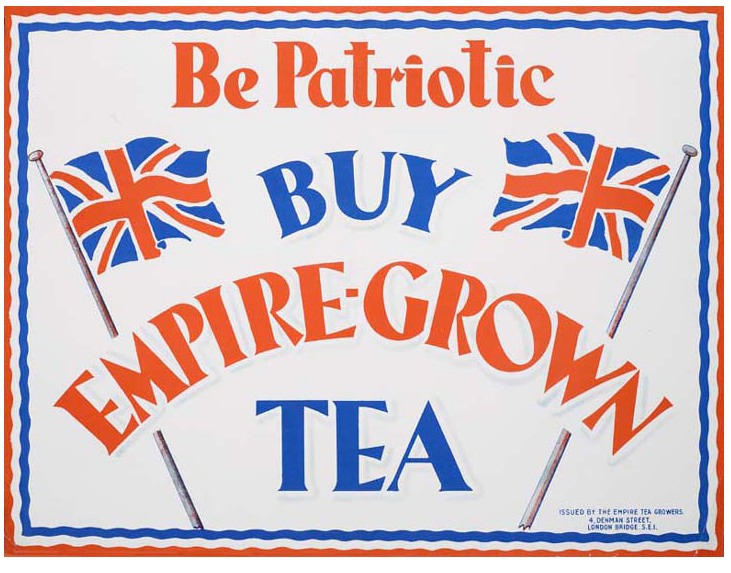FORMATION OF THE STERLING BLOC

Imperial Preference
This was to be the next stage in the cracking open of the moral and economic ideal Britain was supposed to represent in the world, replacing free trade with the previously rejected policy of 'imperial preference.' According to Skidelsky (Keynes ii, p.434) one immediate result was the emergence of the 'sterling bloc' - 'the group of over twenty nations, mainly primary producers, who had devalued their currencies in line with sterling in order to preserve their entry to the British market.' He continues: 'This collective devaluation had also freed the debtor group of nations from the thrall of the creditor nations, led by the United States and France, which remained on the gold standard.' Obviously from the point of view of the 'creditor' nations this mass devaluation was an act of theft, defaulting on the loans these countries had received. Britain had begun what is often described as the 'beggar-thy-neighbour' period of competitive devaluations through the 1930s. The United States and France were soon off the gold standard. 'The number of countries on the Gold Standard dropped from 48 in 1931 to zero in 1937, as governments suspended gold convertibility to enhance competitiveness through exchange depreciation. These moves coincided with dramatic increases in trade protection and the formation of exclusive trade and currency zones, which had corrosive effects on the multilateral system.' (7) According to a description by an American Foreign Affairs theorist, Steven Lobell:
'By 1931, Britain was no longer a free trader. In February 1932, Neville Chamberlain, Joseph Chamberlain's son, advanced his father's dream of Empire Free Trade. Chamberlain introduced the Import Duties Bill which could reduce tariffs in favor of countries of the Empire with whom preferential trading agreements could be made. The Import Duties Bill called for (1) imposition of a general customs duty of 10 percent on almost all imports, (2) exemption from the duty of goods from within the Empire, pending the Imperial Economic Conference to be held in Ottawa, (3) exemption of certain other goods, which were placed on a free list. In August 1932, at the Ottawa Conference, Britain formally adopted a commercial policy of imperial preferences. The Ottawa Conference produced a network of twelve bilateral agreements among the Commonwealth countries, granting special trading privileges to British Commonwealth countries. Britain offered imperial preferences in return for concessions by the Dominions for British manufactured goods (the exchange was primarily foodstuffs from the Dominions for British manufactured goods). The result was that Britain's exports to the Dominions received preference, but chiefly by increasing the tariff against foreign goods.
'The Ottawa agreements were followed by seventeen trade agreements (1932-1935), creating a vast Sterling Area. The Sterling Area was a group of countries that chose to follow the pound sterling. These were countries that were heavily dependent on the British market, did most of their trade in sterling, and/or fixed their own currencies' exchange rate in relation to the pound, and held some or all of their reserves in sterling. The countries included Finland, Norway, Sweden, Denmark, Estonia, Latvia, Lithuania, Iceland, Portugal, the British Empire (excluding Canada and British Honduras [but including Ireland - PB]), the mandates, Egypt-Sudan, Thailand, and Argentina.' (8)
(7) Kerry A.Chase: 'Imperial protection and strategic trade policy in the interwar period', Review of international political economy, Vol.11 No. 1 (Feb 2004), p.179.
(8) Steven E. Lobell: 'Second image reversed politics: Britain's choice of freer trade or imperial preferences, 1903-1906, 1917-1923, 1930-1932', International Studies Quarterly, Vol.13, No.4, Dec. 1999, p.680. Lobell, Professor of Political Science in the University of Utah, is a 'Neo-Classical Realist', concerned with understanding the conditions necessary to maintain American hegemony in the world.
This was broadly the system Morgenthau and White hoped to break in the post-war reconstruction of a 'multilateral' trade system. The story of how they succeeded through wartime negotiations conducted with Keynes as representative of the UK will be told in the next episode. It is a story given added piquancy when we learn that White was secretly channelling confidential information to the Soviet Union, while Keynes's extremely interesting but unsuccessful counter-proposal was partly inspired by Hjalmar Schacht's management of the German economy in the 1930s and Walther Funk's plan for the reorganisation of Western Europe after the fall of France.